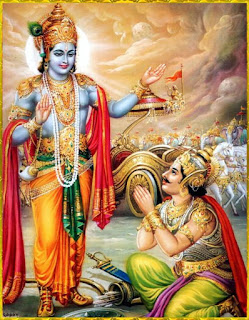Swadharma continued…
While Paradharma (duties at worldly level)
varies depending upon whether one is a soldier, doctor, lawyer, teacher etc. ATMADHARMA
is the same for all.
Human being alone has the faculty of
discrimination (Buddhi / Intellect) and thus Atmadharma becomes relevant and
applicable in the case of humans alone, on the other hand, animals have no
discriminating power and are therefore bound by Paradharma alone, which they
observe by God-endowed instinct.
People often wonder why Krishna asked Arjuna
to fight and kill. Fighting are the secondary aspects of Krishna’s
advice. Basically, what Krishna was teaching arjuna was-
“DO THE DUTY TO WHICH YOU ARE BORN”
(The only duty for which we are born is to realize God, is it not?)
In case of a soldier, it is an accepted fact
that throughout the world that it is the duty of a soldier to fight when
necessary.
Now there is a question. Suppose one is a soldier. A soldier is supposed to obey orders of his senior. Does
he, under the circumstances, blindly obey orders, no matter what they are?
In World War 2, Hitler orders the mass
killing of the Jews. All Nazi soldiers executed their king’s orders and when
they faced trial as war criminals, they all pleaded that they were merely
following the orders.
A soldier must no doubt follow his Paradharma
but that does not mean blindly obeying orders, especially immoral ones.
Paradharma is always subservient to Atmadharma. Killing Jews has nothing to do with the war but to do with Hitler who had hatred for the Jews.
If with such a motive, the king ordered for
killing the Jews, it was wrong and immoral and therefore
the order should not have been followed, even if it means that the
punishment for not obeying the order is death, it is better to accept the same
instead of accepting an immoral order.
Thus, even the teachings of Krishna in
these verses on Swadharma, are based on “THE ATMAN or THE SELF”.
Swami says,
 “You should correctly understand the meaning
of the term “Swadharma and Paradharma used in the Gita. The meaning
of Swadharma is Atmadharma, and not the duties or Dharma based on different
castes such as Brahmana Dharma, Kshatriya Dharma and so on. Likewise,
Paradharma means dehadharma, the duty related to the body.
“You should correctly understand the meaning
of the term “Swadharma and Paradharma used in the Gita. The meaning
of Swadharma is Atmadharma, and not the duties or Dharma based on different
castes such as Brahmana Dharma, Kshatriya Dharma and so on. Likewise,
Paradharma means dehadharma, the duty related to the body.
It is in this sense that you should
understand the declaration in the Gita, “Paradharma Bhaya Vahah”,
which in effect means that if you follow the Dehadharma or the Dharma of the
Physical Body, fear will be lot in life.
On the other hand, if you understand the real
meaning of the verses and words in the Gita, and if you live your life
accordingly, you will have no fear of ridicule, sorrow or suffering”
(Extract from the book - “Message of the
Lord”)
We end this subject with the classic example
of Prahlada story.
The scriptures say that one must treat one’s
parents as God. In practical terms, it means “Obey your parents”.
Prahlada’s father orders him to deny God and instead
worship him as almighty.
Here, Paradharma says, “obey your father’,
but Atmadharma says, “NEVER EVER DENY GOD”.
In this case, there was a clear conflict between the two Dharma.
Prahlada chose Atmadharma over Paradharma,
proving to the world (for centuries to follow) that “Paradharma has to be within the Atmadharma and if it conflicts with
Atma dharma, then it should not be followed”.
The moral lesson which Krishna gives to us
through these verses on action / Dharma in this chapter is,
One must follow Atmadharma,
which is possible only if one is tuned to Atman / SELF.
Love.




